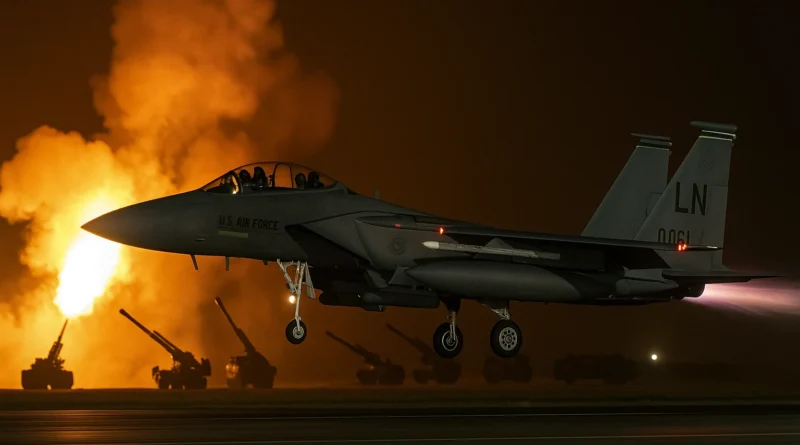United States Launches Direct Strikes on Iranian Nuclear Facilities, Escalating Regional Conflict
Washington D.C. / Tehran – The United States has directly intervened in the escalating conflict between Israel and Iran, conducting military strikes on three key Iranian nuclear facilities in the early hours of Sunday, June 22, 2025 (local time). President Donald Trump announced the operation, describing it as a “spectacular military success” aimed at obliterating Iran’s nuclear enrichment capacity and forcing an end to its ongoing war with Israel.
The strikes targeted critical sites: Fordo, Natanz, and Isfahan, all central to Iran’s nuclear program. According to U.S. officials, the operation involved B-2 stealth bombers deploying 30,000-pound “bunker-buster” bombs (GBU-57 Massive Ordnance Penetrators, or MOPs) on the deeply fortified Fordo nuclear fuel enrichment plant. Additionally, reports indicate U.S. submarines launched approximately 30 Tomahawk missiles at Natanz and Isfahan.
Trump’s Announcement and Justification
President Trump confirmed the military action via social media posts, stating, “We have completed our very successful attack on the three Nuclear sites in Iran, including Fordow, Natanz, and Esfahan. All planes are now outside of Iran’s airspace. A full payload of BOMBS was dropped on the primary site, Fordow. All planes are safely on their way home.” He further declared, “This is a HISTORIC MOMENT FOR THE UNITED STATES OF AMERICA, ISRAEL, AND THE WORLD. IRAN MUST NOW AGREE TO END THIS WAR. THANK YOU!”
The decision to launch direct strikes marks a significant escalation, following more than a week of intense missile and drone exchanges between Israel and Iran. Israel had initiated a campaign of strikes on Iranian military and nuclear targets since June 13, prompting Iranian retaliation that has resulted in casualties on both sides. U.S. and Israeli officials have consistently argued that American bunker-buster bombs offered the best chance of destroying Iran’s deeply buried nuclear facilities.
Iran’s Fury and Vow of Retaliation
Iranian officials swiftly condemned the U.S. actions. Foreign Minister Abbas Araghchi accused the United States of breaching international law and the Nuclear Non-Proliferation Treaty (NPT). “The United States, a permanent member of the United Nations Security Council, has committed a grave violation of the UN Charter, international law, and the NPT by attacking Iran’s peaceful nuclear installations,” Araghchi stated, warning of “everlasting consequences” and affirming Iran’s right to defend its sovereignty. Iran’s Atomic Energy Organization confirmed attacks on its sites but insisted that its nuclear work would not be halted. State media also reported that personnel at the nuclear sites had been evacuated prior to the attacks.
Following the U.S. strikes, Iranian missiles reportedly hit central and northern Israel, including the Soroka Medical Center, causing damage and injuries, and the Tel Aviv Stock Exchange.
International Reactions and Immediate Aftermath
The U.S. strikes have triggered widespread international reactions:
- Israel: Prime Minister Benjamin Netanyahu lauded President Trump’s “bold decision,” stating that “history will record that President Trump acted to deny the world’s most dangerous regime the world’s most dangerous weapons.” Israel subsequently announced the closure of its airspace to all inbound and outbound flights.
- United Nations: UN Secretary-General Antonio Guterres expressed grave alarm, calling the strikes a “dangerous escalation” and a “direct threat to international peace and security.” He reiterated that “there is no military solution” and urged all parties to uphold international law.
- Other Nations: Countries like Qatar warned of “catastrophic consequences,” while the European Union’s top diplomat called for de-escalation and a return to negotiations. Domestic reactions within the U.S. were mixed, with some Republican lawmakers praising the action while others, including Democrats, questioned its constitutionality without Congressional authorization.
The Pentagon is expected to provide a detailed briefing on the operation. The immediate impact on regional stability and the future trajectory of the Iran-Israel conflict remains uncertain, with the world on edge awaiting further developments.

